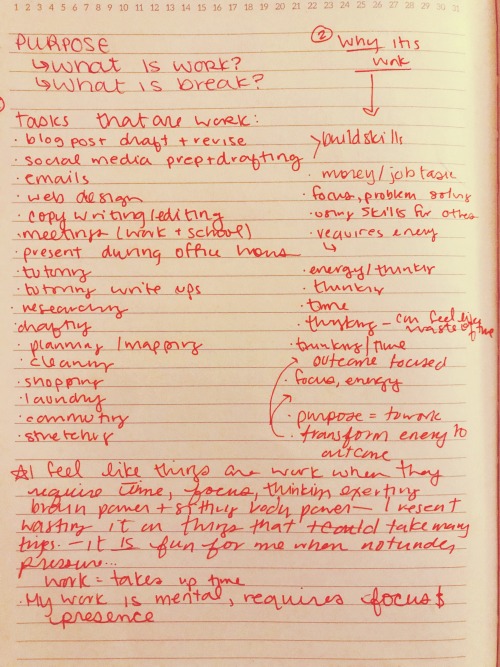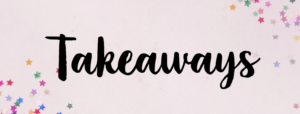I had a little breakdown last week.
I knew it was coming because I kept thinking, Is this the day where I finally cry in public? My go-to breakdown moves are crying in public or leaving work early because I am worried I will break down before I can make it to my car. Eventually, I did give in, sat down on my floor, and cried on and off for the rest of the night.
My mini-breakdown was precipitated a combination of feelings, namely exhaustion and confusion as to why I wasn’t getting more work done. If I felt that exhausted, why didn’t I have more to show for it? I was tiring myself out by the evening, but I felt like I was treading water.
I decided that my current approach to work was no longer sustainable. I needed to check in with how I was approaching work and shift something (or run the risk of another meltdown). In what follows, I walk you through the action and reflection processes I followed and I share how I shifted my perspective by separating “work” from “not work.” As always, I include practical takeaways that you can apply to your own lives.
Performing a Work Inventory
Guided by Marlee Grace’s How to Not Always Be Working: A Toolkit for Creativity and Radical Self Care, I examined the kinds of “work” I was doing, from the most demanding and general to the most personal and invisible.
What IS Work?
Grace encourages her readers to “identify tasks you perform that are work” and then asks readers to identify what exactly it is about each individual task that makes it feel like work (14). Here’s what my list looked like:

Reading back over my hen-scratch showed me interesting things:
- My work falls into a few categories: office manager-ing, tutoring, consulting, blogging, dissertating, errands, self care/healing.
- These categories include overlapping actions: writing, revising, researching, focusing, planning, moving my body, interacting with others, thinking on my feet/in the moment.
- These actions use time, focus, and multiple, overlapping energy sources: mental, physical, emotional, self esteem/confidence.
I noticed that a big part of what makes something feel like “work” for me is that the reward is forthcoming, later, potential: I am building skills, practicing, working on a long term project. When I see my work tasks as a part of a never-ending process, I run the risk of feeling like I never actually “do” things of substance. When this happens, I burn out my energy sources and have the mini-breakdown I mentioned above. Also, even though I actually do enjoy the processes of problem solving, I end up resenting tasks that feel like they take too many tries because I feel protective of spending my time and focus resources.
What IS NOT Work?
When discussing tasks that are not work, Grace asks “Where is my time? What does it mean to not work?” (29). Guided by this, I wrote my own “not work” list. It included things like:
- reading in the bath
- walking in nature
- relaxing with my Sweetie
- window shopping
- playing with craft materials
- catching up with friends
If I were to assign categories and actions for these not work tasks, it’d be things like connecting, relaxing, self care, creating, considering. I do my not work tasks privately or share the experience with my Sweetie or my close friends. I still expend time and focus on doing not work tasks, but I feel like these tasks are more likely to replenish than deplete my energy sources.
Why Does It Matter?
If one of the key things that defined “work” was that the reward would come at a later time and date, a thing that made not work tasks not feel like work was that they required my presence.
Another way to word this would be: I tend to thrive in the work that allows me to feel present, and I tend to struggle with work that rests in a vague end result. Knowing this, I vow to make some shifts:
- I want to spend my work energy resources with intention.
- I want to shift my perspective to feel more confident in myself.
- I want increase the number of not work tasks in my life.

First, I highly recommend that you purchase Marlee Grace’s How to Not Always Be Working: A Toolkit for Creativity and Radical Self Care (&/or request it from your local library) and that you work through her toolkit. Her writing is beautiful and accessible, and I love how she uses her personal experiences as examples and metaphors. She’s also sober and queer, which drew me to her work even more.
Below, I share two action and reflection steps that I completed while I was working through my own work and not work and why it matters lists. Feel free to adapt them to your own uses!
Chart out and visualize your work tasks.
You can do this by hand or you can use this Google Sheet as a guide. Like the monitoring guide from Week 46, this Sheet is publicly editable, so please first download it or copy and paste it into your own Google Sheet or Excel file before you start filling it out.
If you do it by hand, draw up a chart that allows you to list your tasks on the left side column and then label the following columns with these prompts (look at the Google Sheet for an example):
- Column 1: Tasks
- Column 2: What makes it work?
- Column 3: When is it fun/enjoyable/makes me proud of myself?
- Column 4: When is it exhausting/makes me resentful, grumpy, or sad?
- Column 5: What is my ideal way to do this task?
- Column 6: Is there a solution to make it more enjoyable?
Answer each question for each task. Pay particular attention to patterns that emerge around types of tasks or answers down a particular column.
Get to know yourself when it comes to why you work and not work as you do.
I asked myself the following questions when I was trying to pinpoint ways to improve my relationship to work and not work.
Answer the following questions in a journal or out loud to a friend:
- Does being present make me more effective at doing my task? Why? How do I feel about my answer?
- Does being present help me to be more honest with myself about how I’m choosing to expend my resources? How do I feel about my answer?
- What kinds of work are outcome based? Who enjoys the outcomes of my work? Do I ever get to enjoy the outcomes? If not, how can I enjoy my own outcomes?
- What am I proud of doing? Start saying out loud to yourself and to your loved ones when you feel proud of yourself: I’m proud of myself for ____.
- What throws me off balance from feeling confident in my ability to complete a task? What throws me off balance from feeling like a task is enjoyable/fun/something that makes me proud?
*Please note that the original version of this blog post was published here.
newsletter and free resources
Sign up below to access six free resources and my newsletter, tending.

